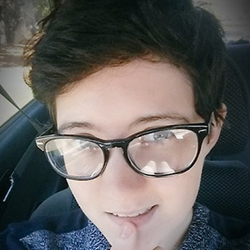Making It To Taste
It’s late October at the house just outside of campus. From where you’re lying on the couch, the party is loud, the room is soft around the edges, and you haven’t felt this okay in weeks. Only one person called you “she” today and there’s banana-flavored Laffy-Taffy on the table by the drinks. No one else likes banana-flavored Laffy-Taffy so you get to have as many as you want.
“Being mentally ill fucking sucks,” your friend complains from a nearby beanbag chair, drunk.
“For real,” you agree, because being mentally ill fucking sucks.
“Fuck the establishment, maaaan!” someone ends up saying, sing-song giggling, because it’s easier to manage than: higher education doesn’t give a fuck about us, huh?
It makes you smile. Most things people like you are scared about turn into jokes. They kind of have to.
You’re tired of being scared all the time.
See, you’re someone who tends to notice things—lots of things. More things than most.
They’re things worth being scared of and not worth being scared of, alike. Sometimes it’s hard to tell which is which with all the things you notice. Things like the way she’s looked at you since you made out at the party last New Year’s Eve.
It’s nice, being wanted. Nice but dangerous. Like making a drink to taste after you’ve already had a few. You don’t exactly trust yourself.
You’re too sad and scared and lonely to trust yourself with things that make you feel good.
She’s sitting on the couch across from you and you are falling sideways into the cushions, snickering. You’re doing that thing again; you’re letting too much slip. You wonder how many jokes you can make about handcuffs and riding crops before she realizes it’s one of those things. Something serious that you joke about to make it less powerful. Less important.
It occurs to you, drunk with a face full of couch, just how much you are always holding back because of fear. And it’s stupid, you think. You know her. She listens with tilted-head interest, is so considerate it makes you ache, but your biology has you hardwired for terror at every turn.
Later, in the dark after more people have left, you slur an apology—a confession—into the soft shoulder of her sweater.
“Sorry ‘m not more, like, physically affectionate when ‘m sober.” You’re holding her hand and it feels wonderful. Dangerous. “Just nervous all the time. Doesn’t mean I don’ like you.”
Affection is something that enters and exits you in corkscrews.
You want her to touch your cheek, to stroke (maybe pull) your hair. To tell you that you are good. You don’t trust yourself to believe it on your own. She has never called you by a word or pronoun you haven’t asked her to, and that kind of trust is a rare commodity for someone like you.
You feel small with her hand on your knee. It’s a good kind of small. A safe kind of small.
“That’s okay,” she says.
You’re not sure how to do anything besides want from inside your own head. If you try to tell her any of this you fear it might all come rushing out at once: your selfishness, your off-center desires, your need, your need.
There’s so much you want. There is so much you don’t trust yourself to have.
Fuck. Most people probably don’t engage in this level of self-sabotage.
The two of you go out into the backyard and join the lazy, wobbling circle of people passing around a joint. It’s cold enough that your left hand ends up inside her right coat pocket. A handful of minutes later you hear yourself, clumsy, rambling out your entire worldview, zig-zagging around stories you’re not allowed to tell until there is snow on the ground. Listen to yourself, you think. You knew you would say too much.
High and a little drunk and you still can’t stop cringing at your constantly leaking edges. You hate yourself for being so much sometimes. Here, you want say—want to offer her the loose ends of your marionette strings—let me not be a person for a little while.
She is soft in her words and her eyes and it makes you hope so much that it aches.
You have a theory that maybe this is why so many people like you are into BDSM. Maybe they don’t want to be scared of feeling good. Maybe they just want to be able to trust other people for a change.
The two of you head back into the house where almost every room is dark now. You stumble, laughing, and follow her like a lost puppy. She invites you to sleep in her bed instead of on the couch. It’s so much easier to just say “yes” than to have asked. You wish she would ask you other things you would say “yes” to.
That night you dream of autumn leaves. Of banana Laffy-Taffys and pot smoke. Of leather cuffs around your wrists. When you wake, it is to find her asleep beside you with a hand on your stomach and a leg over yours.
You don’t trust yourself to do anything but take her hand.

Zoë Johnson is a queer transgender non-binary writer living in mid-Michigan. They are an enrolled member of the Sault Ste. Marie Tribe of Chippewa Indians and a creative writing MFA candidate at the Institute of American Indian Arts.
Their fiction has been shortlisted for PRISM International‘s 2019 Jacob Zilber Prize for Short Fiction and was a finalist for the 2018 Lascaux Review Prize for Short Fiction. Work of theirs has been published in PULP Literature, Eastern Iowa Review, Plentitude Magazine, Sonora Review Online, and been anthologized in the Lascaux Prize Vol. 6, as well as Public Poetry‘s 2019 contest finalist anthology “ENOUGH.” Their work is forthcoming bilingually in The Polyglot #6, and as part of “Trans Bodies, Trans Selves” from Oxford University Press in 2021. When not writing, Zoë spends their time doting on their cat Strawberry, learning their tribal language of Anishinaabemowin, and getting far too invested in podcasts.

